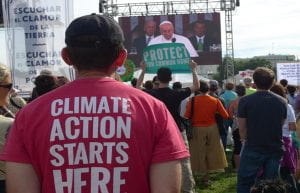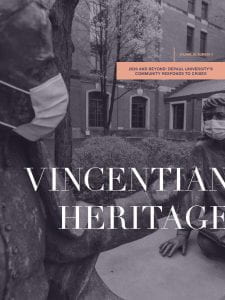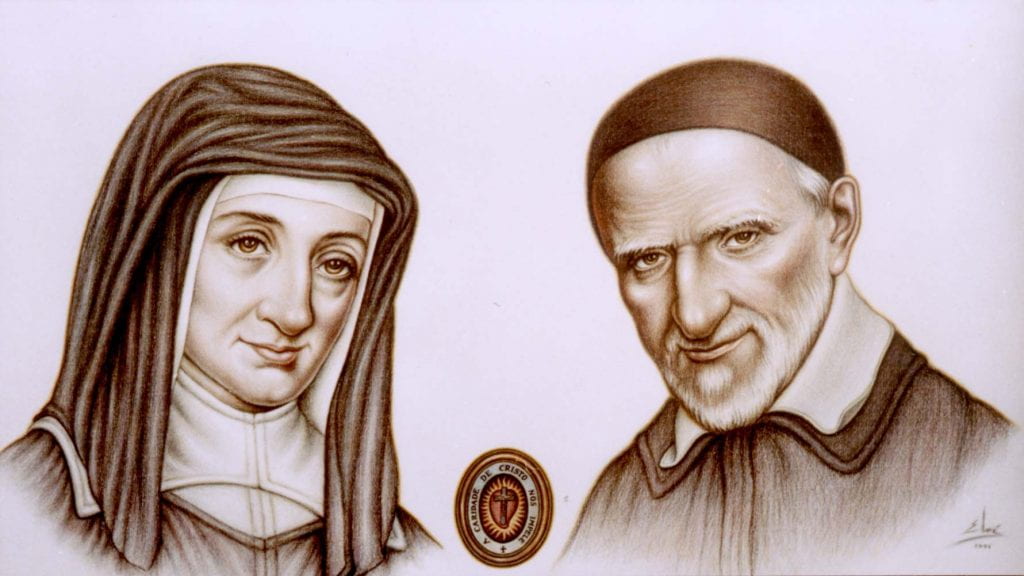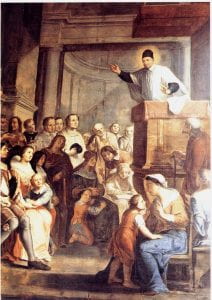Vincent was a trailblazer, a true change agent of his day. He was a man who saw hope and possibility despite the challenges of his time. He felt a keen dissatisfaction in the gap between the way the world should be and the way the world was. Throughout his 79 years, Vincent sought to close that divide, asking “what must be done” and acting on the answers he found. Four hundred years later, DePaul University continues to carry forward his legacy by educating the next generation of trailblazers.
During Vincentian Heritage Week the Division of Mission and Ministry will host the key events below.
Sunday Night Mass & BBQ
Sunday, September 22| Mass 5 pm & BBQ at 6 pm | St. Vincent DePaul Parish
Join Catholic Campus Ministry and St. Vincent de Paul Parish for a (free) BBQ on the Parish Lawn (on Webster Ave.) to celebrate the Feast Day directly following 5pm mass.
Whether you go to Mass weekly, occasionally, or have never been to a Catholic Mass, you are welcome here! Come celebrate! Walk-ins are welcome. You may also RSVP Here.
In To Light
Join us on September 23rd for In To Light, an inspiring evening where you’ll experience the power of art and storytelling to spark transformation. Through dance, music, and poetry, discover new perspectives on light and its role in overcoming challenges. After the performance, engage in meaningful conversations, sharing personal stories and reflecting on how to bring more light into your own life. This is a unique opportunity to connect with fellow students, faculty, and staff, and leave feeling uplifted and empowered. RSVP Here.
Loop Mini Vinny Fest
Tuesday, September 24 | 2 – 4 pm | Loop DePaul Center Concourse
Join Office of Student Involvement and Mission and Ministry for Loop Mini Vinny Fest! Celebrate our namesake’s Feast Day and DePaul University with fun, food, games, photos, free t-shirts and more! This is a DePaul tradition you don’t want to miss!
No formal registration is required, but you may RSVP Here.
Sustainability Network Weaving: Climate Action Plan
Tuesday, September 24 | 4 – 6:30 pm | 1 E. Jackson Boulevard, Loop DePaul Center 8005
Monday, September 30| 4 – 6:30 pm | LPSC Room 314B
What is a Climate Action Plan (CAP)? How can it help DePaul address equitable sustainability and help us understand where to improve? What can we learn from local and national CAP exemplars? Join the conversation and network weave with sustainability stewards from DePaul and beyond—hosted in the Loop (hybrid) and Lincoln Park campuses.
St. Vincent DePaul Heritage Week Luncheon
Wednesday, September 25 | 12 – 1:30 pm |DePaul Club 11018
Join the DePaul community at our annual St. Vincent de Paul Heritage Luncheon! The event (with a hybrid option) will take place in the DePaul Club Room 11018 of The DePaul Center beginning at noon. We hope you can join us! We will also be hosting the conversation via Zoom, for those who cannot join us in person.
Please RSVP for either in-person or remote attendance. Specify location.
St. Vincent DePaul Prayer Breakfast
Friday, September 27 | 9 – 10:30 am | Student Center 120 A & B
Come celebrate our shared Vincentian heritage with delicious food and great community at our annual St. Vincent de Paul Prayer Breakfast! This year, we will welcome as our keynote speaker, Dr. Valerie Johnson, Associate Provost, Diversity, Equity and Inclusion, who will share how she integrates the mission into her professional and personal life.
This will be a great chance to hear Dr. Johnson and join together in community, gathered together for the sake of a mission. All are welcome!
RSVP Here
Loop Feast Day Mass & Lunch
Friday, September 27 | 12 pm
Mass | Miraculous Medal Chapel (Lewis Center)
Lunch to follow
For those wishing to attend mass celebrating St. Vincent de Paul’s Feast Day, mass will be held in the Miraculous Medal Chapel (Lewis Center – First Floor) for lunch after mass. All are welcome!
An RSVP is required to attend the luncheon. Please RSVP Here.
Lincoln Park Feast Day Mass & Refreshments
Friday, September 27 | Lincoln Park Campus
Mass |12 pm | St. Louise de Marillac Chapel
Refreshments | 12:45pm | (CCM Student Center 104)
Celebrate our namesake’s Feast Day with a celebratory mass at 12:00pm in the St. Louise de Marillac Chapel. Everyone is welcome! Join us afterwards for refreshments across the hall in Catholic Campus Ministry (Student Center – Suite 104).
Walk-ins are welcome, however you may reserve your spot here.
Vinny Fest
Friday, September 27 | 2 pm – 4 pm | Lincoln Park Quad & St. Vincent’s Circle
Join us for Vinny Fest 2024, a DePaul tradition to honor and celebrate St. Vincent de Paul’s legacy with fun, games, photos with Vincent, free food, and more! Vinny Fest features student organizations, offices, and departments as they host engaging activities to celebrate our mission in action as a DePaul community. Follow @depaulvia to stay up to date.
RSVP Here
For more information contact: sodonogh@depaul.edu











